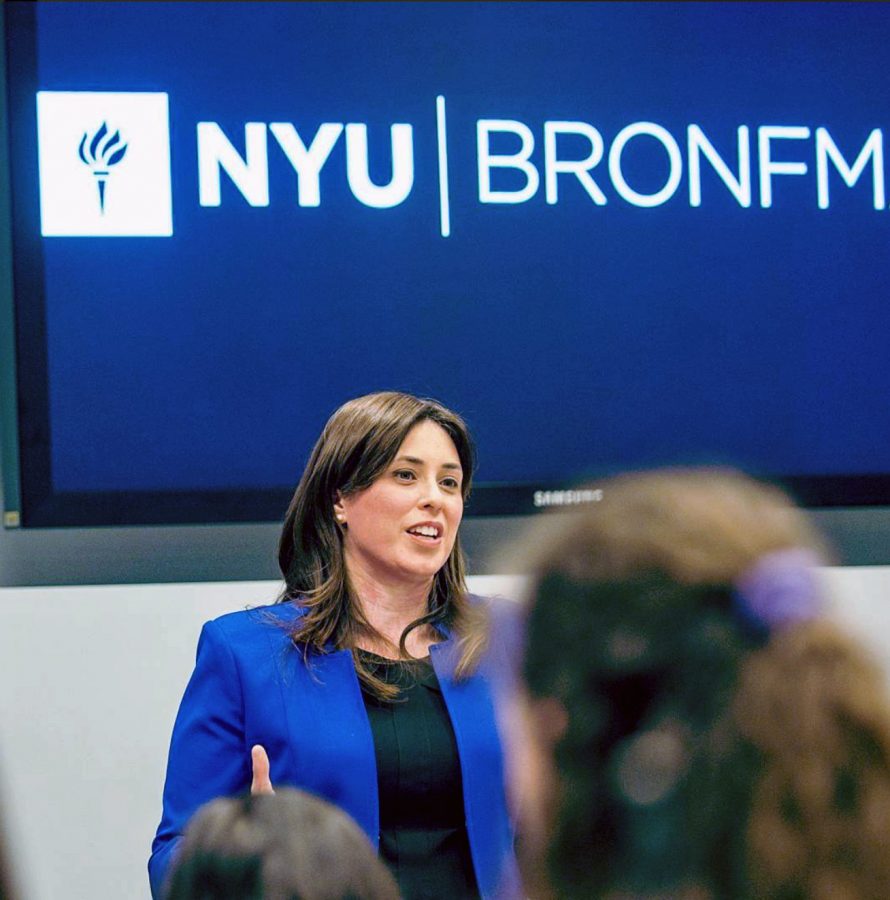Israeli Deputy Foreign Minister Visits
Controversial conservative Israeli Deputy Foreign Minister Tzipi Hotovely spoke to an invitation-only audience at GCASL on Nov. 7.
November 20, 2017
On a college campus speaking tour targeting elite institutions in the northeast corridor, hardline conservative Israeli Deputy Foreign Minister Tzipi Hotovely stopped at NYU on Nov. 7 and spoke to a small group of students at the Global Center for Academic and Spiritual Life.
The talk was originally scheduled as a public event to take place at the NYU Bronfman Center for Jewish Student Life, but was later rescheduled, made invitation-only and pushed under the radar by TorchPAC and Bronfman Center organizers.
TorchPAC, a campus group aimed at supporting and promoting American-Israeli relations, was approached by the United Nations Consulate General of Israel to make NYU a stop on the tour, which Hotovely promoted in part as a way to encourage free speech.
Her talk at NYU was held three days after Hillel International, a widespread Jewish campus organization, canceled her scheduled speech at Princeton University following pressure from progressive Jewish groups on campus.
Hotovely, a member of the conservative Israeli Likud party, is known for her right-wing ideology on Palestinian statehood and her case for Israeli settlements, which have been determined to be illegal under international law.
While TorchPAC and the Bronfman Center viewed the talk as an opportunity for students to interact directly with Israeli politics, left-leaning Israeli groups on campus were critical of the Bronfman Center’s decision to host Hotovely and the extremely right-wing message she presented to the small group who attended.
“We are a group that believes in open discussion regarding the Middle East,” Steinhardt junior and TorchPAC co-President Jake Steel said in an email. “We were given the opportunity to engage with an Israeli member of the Foreign Ministry and wanted to have a personal conversation with her.”
While the talk was originally promoted publicly on Facebook, TorchPAC leaders said a scheduling conflict with the consulate led to a time change. An email was sent out to parties who had RSVP’d on Facebook directing them to a repurposed event at the Bronfman Center. Meanwhile, invitations to Hotovely’s rescheduled talk were only extended to a small group of leaders of campus
Israeli organizations.
“We invited active members of our community,” Steel said.
The closing of the event to the public halted protests being organized by NYU’s left-leaning Jewish Voices for Peace, among others.
“We were going to read statements about why we opposed and why she was racist and walk out or have a silent protest,” a representative for JVP said. “Then we received an email saying the event was canceled. But instead of canceling the event, it became a private event. We only found out a few days later that it happened.”
Along with the small group of students invited, several members of Hillel International attended, including the group’s President Eric Fingerhut, who addressed the cancellation of Hotovely’s Princeton talk.
While Hotovely ended up speaking at Princeton in an event sponsored by the campus chapter of Chabad, Fingerhut apologized for Hillel International’s treatment of the politician, referencing an apologetic Jerusalem Post op-ed he authored. The column explained the reason for the cancellation, as well as Fingerhut’s regrets.
“We did this because it had not been reviewed by the Center for Jewish Life’s Israel Advisory Committee, which is designed to review and facilitate a broad range of Israel programming throughout the year,” the article read. “To be clear: This was not a good enough reason to postpone the event, and for that mistake, we apologize.”
After a warm introduction by Fingerhut, Hotovely began her engagement with students.
She expressed her desire to listen to student ideas. After hearing a few audience questions, she spoke at length about the Israel-Palestine conflict, asserting that the issue at hand was not about territory, but about ideology.
Hotovely referenced Palestine’s inability to compromise for Holy Land territory during the Camp David Accords, citing Palestinian stubbornness and ideological difference as the reason peace was not achieved. She brought up Israel’s track record for peace with the Egypt-Israel Peace Treaty of 1978.
She also discussed the grim condition of the Palestinian-settled Gaza Strip, referencing United States funding that, in part, ended up backing terrorist organizations. Perhaps her most controversial assertion was when she described Palestinian children being raised with the desire to deny the Jewish state.
Hotovely’s words stirred reactions from members of the crowd, and she engaged in some heated back-and-forth with audience members.
“The Deputy Foreign Minister shared her thoughts on current foreign affairs and fielded questions from students, some of which were very challenging,” Steel said. “The event was a huge success as students were able to have a deep dialogue with the Israeli official. We had a meaningful debrief with our group afterwards to synthesize what the Deputy said and our collective thoughts.”
NYU JVP has taken a clear stance on her message and is critical of the Bronfman Center and Hillel International for allowing Hotovely to speak on campus.
“One of [Hotovely’s] pamphlets is called ‘The Case for the Settlement,’ which is against international law,” a JVP representative said. “She was on campus to promote that, which we think is unacceptable. It shows the hypocrisy of the Bronfman Center and the extent to which they are only serving their donors [Hillel International].”
According to the Bronfman Center, organizing this event was viewed as an educational opportunity for students to engage with the Israeli government.
“The Bronfman mission is to provide transformative experiences to NYU students with an interest in Jewish life,” Bronfman Director Rabbi Yehuda Sarna said in an email. “For students who are politically-minded, meeting with senior political officials can certainly be transformative. Bronfman is driven by an educational mission, not a political one.”
But JVP argues that Hotovely’s demonization of Islam and Palestine is enough to warrant keeping her message away from campus and, moreover, that opposing groups should have been allowed to protest the talk.
“Tzipi is just an outright racist,” a JVP representative said. “Academic freedom should apply to student groups within colleges and universities. It’s jarring to see that many students on campus are willing to tolerate this and not stand up against it.”
Jake Steel has contributed to WSN.
Correction: Dec. 4
A previous version of this article said that Hotolevy was the Foreign Minister of Israel when Hotovely is the Deputy Foreign Minister. The article has since been fixed.
A version of this article appeared in the Monday, Nov. 20 print edition.
Email Sakshi Venkatraman at [email protected].

























































































































































